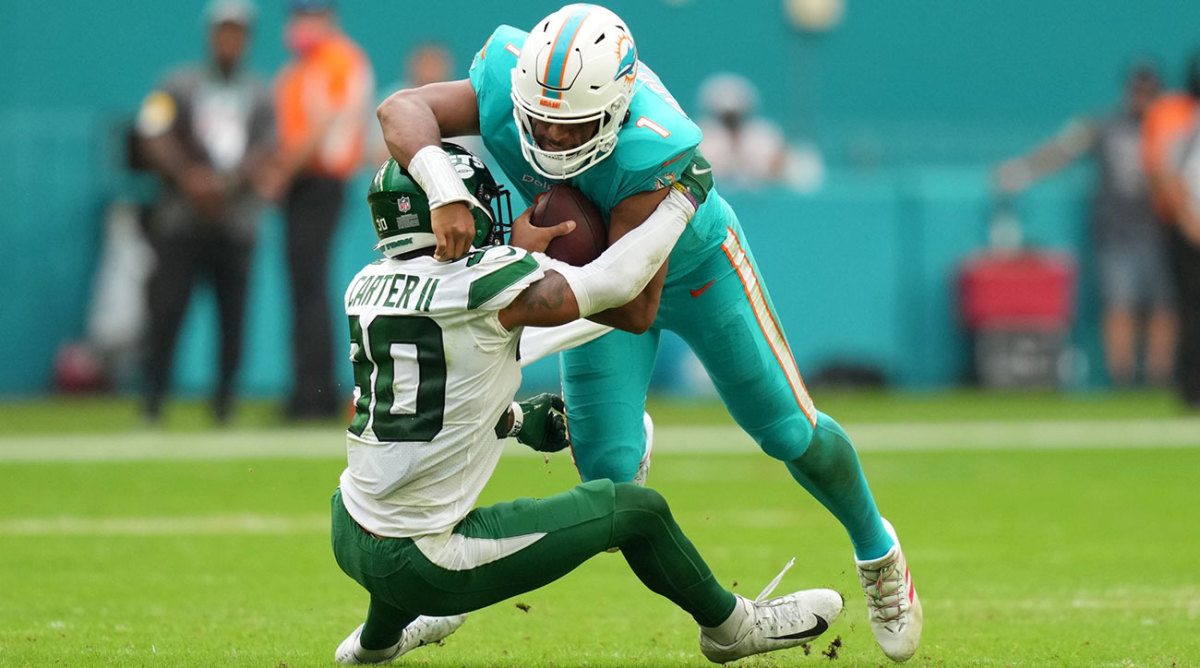The Dolphins Didn't Need a Quick Fix to Find an Identity

Toward the end of the third quarter on Sunday, in a 31–24 win over the Jets, Dolphins quarterback Tua Tagovailoa saw nothing appetizing during his progressions and began his somewhat frantic, trademark scramble out of the pocket en route to the first-down marker.
In front of him was Jets cornerback Michael Carter II, who was squaring up the QB for a textbook open-field tackle. Sensing a series of feigned jukes were not going to lead to increased yardage, he lowered his shoulder and hammered Carter with his right forearm. When he regained his footing, he was in full flex, followed by his tight end and an offensive linemen, alternately acting as his personal hype men and coddling him in appreciation.
TRUCK STICK TUA
— Sports Illustrated (@SInow) December 19, 2021
(via @NFL)pic.twitter.com/eQzwjtMELC
There have been plenty of season-defining moments throughout the six-game winning streak that has brought the Miami back from the brink of a full-scale regime change to a formidable 11% chance of reaching the playoffs (according to FiveThirtyEight, through the conclusion of Sunday’s late-afternoon games). But Tagovailoa’s scramble, which still fell a bit short of the first-down marker, was a fitting visual—a glimpse of good enough, of perfect imperfections, that all seem to add up. Later on that same drive, the Dolphins inserted Jacoby Brissett into the game for a fourth-down quarterback sneak after being stuffed on a third-and-1. They inched closer to the goal line with a pass interference penalty and threw a touchdown pass to their former first-round pick defensive tackle, who leapt into the stands and nearly toppled over backward into the mostly empty row of VIP seating.
Whatever works, right?
Christian Wilkins with the BIG MAN TD!
— Sports Illustrated (@SInow) December 19, 2021
(via @NFLUK)pic.twitter.com/LHOMWTBWpx
At some point when Miami was left for dead at 1–7 on Halloween, still dealing with the waning stages of a troubling pursuit of Texans quarterback Deshaun Watson, they were the furthest example from a team that could claim an identity. In fact, they were hoping to purchase one on the open market for a handful of draft picks, hoping the entire thing wouldn’t blow up in their faces. It was the clearest example of dwindling patience, with the franchise’s facing its fair share of finger-wagging from the league after tanking during Brian Flores’s first year for the chance at a better, more sustainable future.
What they’ve realized throughout this process is that they were capable of winning these games all along. That the full on teardown and rebuild wasn’t necessarily a failure, but, like all good things worth having, a work in progress that doesn’t always yield immediate results. Brian Flores is a better coach than a guy who needs to be bailed out by Watson. Tagovailoa, while not better than Watson, has shown that he’s better than a quarterback who needs to be bailed out by him. Wilkins and Emmanuel Ogbah form one side of a defensive line that is better than a unit that needs to get bailed out by Watson. The same goes for ascending stars like rookie safety Jevon Holland.
The Dolphins are not perfect, but they have shown they are not the desperate ballclub that nearly upended their future for a shot at an identity. They still have time to create one on their own, which would be far more satisfying.

We’re not making sweeping judgments following a few weeks of a season that still has Miami at 7–7 and, realistically, a longshot to crack the playoff picture with a remaining schedule that includes the Saints, Titans and Patriots. But we are pointing out that this is not just a fluke-ridden winning streak against middling opponents (we’re also not saying their opponents were all great, either). The Dolphins have developed young star players. They have started the process of fostering growth at quarterback. They might realistically finish the season as a top-10 defense in DVOA.
By nurturing what they have, the Dolphins now know they can stay the course, which, regardless of how the season finishes, may be the most valuable aspect of their 2021 season. So many of us expected Flores and the Dolphins to take a firm step into consistent playoff contention, but showing that they have the talent to recover when facing tremendous adversity is a nice consolation prize. It’s also a lot cheaper than surrendering your next three first-round draft picks.
